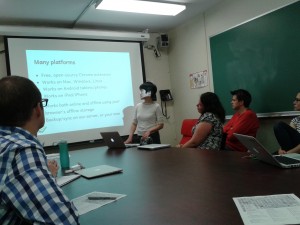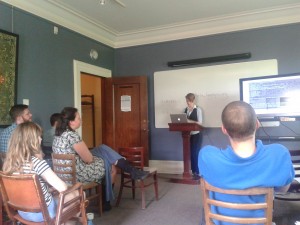Today concluded the two day Computational Field Workshop at McGill University. Plenary speaker Alexis Palmer joined from Saarland University, Germany to talk about her work using computational tools for low-resource languages.
iLanguage Lab along with its collaborators and interns, Hisako Noguchi, Carol Little, Josh Horner, Tobin Skinner, and Louisa Bielig, presented their work in developing the Google Chrome extension and Android App, LingSync. This is particularly useful for field linguists as it store all field data in one secure, customizable, and easy-to-use app. A morning tutorial for the workshop participants was held where they were able to test this app out with data from Quechua.
Robert Henderson also shared his work on using computational tools to clean and analyze texts from SIL bibles translated into Kaqchikel for his work on demonstrative pronouns.
Erin Olson presented her work on using the Prosody Lab’s aligner which aligns text to sound files in Praat. This is a useful tool as it can speed up annotating processes. Scripts for the Prosody Lab Aligner can be found here.
All slides and information from this workshop can be found on the Computational Field Workshop website.
In addition to these great tools, Elise McClay in collaboration with iLanguage Lab is developing a Learn [language] app. This app, still a prototype, will be able to be used in conjunction with LingSync to create customizable languages lessons for any language. Currently there is an example Mi’gmaq lesson on this app. More on this can be found at the Canadian Linguistics Association conference at the University of Victoria, BC. See programme here.
Computational tools, like the aforementioned, can facilitate and accelerate collection and analysis of data from the field. Used in conjunction with native speakers and other researchers such tools can lead to not only better linguistics explanations but also transparency of the research for all parties involved.


